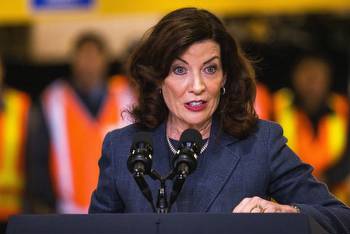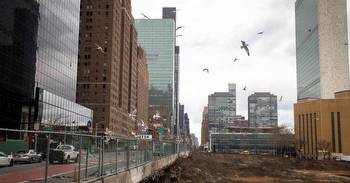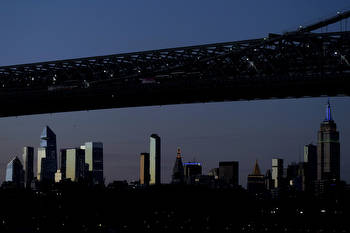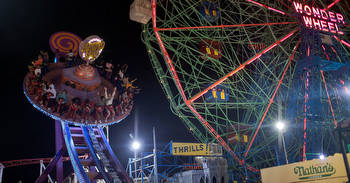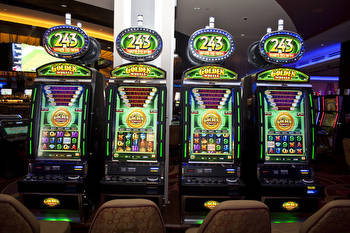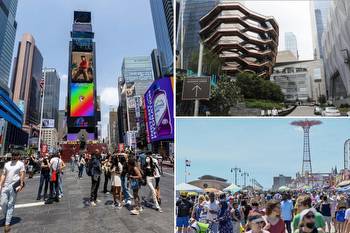Do Casinos and Big Cities Mix? Some Major Real Estate Developers Think So

Thousands of miles east of Las Vegas, big-name developers are clamoring for a rare casino license in one of the most densely-populated cities in the country. A long-in-the-works set of licenses, which will cost at least $500 million each, are up for grabs in New York state, which has led to a rush of bids from companies including Manhattan’s largest landlord, SL Green, mega-developer Related Companies, and the New York-based firm Thor Equities. But while the companies’ billion-dollar bids aim to capitalize on the city’s status as a powerful tourist draw, critics, including city officials and industry groups, don’t think a casino in the heart of New York City is a good idea.
The casino saga began nearly a decade ago when voters approved Las Vegas-style casinos to be built in New York. This April, three full-service casinos were approved in the state budget for the downstate region of New York. The state took another step forward when it named the first members of a board that will oversee the bidding and siting process for the casino licenses last month. The 2013 amendment allows a total of seven new casino licenses in the state, with four designated for the upstate region and three for the downstate region, which includes New York City. However, two of the licenses are widely expected to go to casino properties that are already operating in the area: Resorts Worlds New York in Queens and MGM’s Empire City Casino in Yonkers, just north of Manhattan. Both casinos are currently limited to horse racing and video slot machines, but landing one of the new licenses would give them full status. With two licenses generally thought of as already taken, fierce competition has begun for the last one.
Rolling the dice
The application process for a New York casino license is set to open the first week of January, and as the date grows closer, more hopeful developers have been unveiling or, at the very least, talking about their bids. Thor Equities is one of the latest developers to announce a proposal. For the company’s Founder and Chairman Joe Sitt, building a casino would fulfill a childhood dream. Sitt grew up in South Brooklyn and would skip school to go to amusement parks like the borough’s Coney Island boardwalk, he told the New York Times, even earning the childhood nickname “Joey Coney Island.”
The chance to add a casino to the entertainment mix at the historic tourist destination would also mean reviving an ambitious plan that Sitt first proposed in the early 2000s, though it did not include a casino element. At one point, Sitt was the largest property owner in Coney Island, and in 2005, he was hoping to develop a mixed-use complex with hotels and entertainment to the neighborhood, envisioning “something like the Bellagio hotel,” he told New York Magazine at the time. Though that didn’t come to fruition, his firm still owns several sites near the Boardwalk, and if Thor’s bid (currently the only one from Brooklyn) is accepted, that’s where the casino would go, according to the firm.
Meanwhile, many in the real estate and gaming industries are eyeing Manhattan as the prime spot for a casino. The borough’s largest office landlord, SL Green, has partnered with Caesars Entertainment, the owner of Caesars Palace in Las Vegas and other properties, on a bid for a casino complex in the heart of Times Square. The proposed project would be called Caesars Palace Times Square and would be built as a redevelopment of 1515 Broadway, an office building in the middle of Times Square. The project would include a casino, a Broadway theater, a hotel, and restaurants. Related Companies, the prolific development firm behind Manhattan’s Hudson Yards and other major real estate projects, was one of the first companies to announce a bid for the license. The firm has teamed up with Wynn Resorts on a proposal for a casino on an undeveloped parcel next to the Javits Center in Hudson Yards. Related CEO Jeff Blau said the project’s location near mass transit, the Javits Center, and Midtown Manhattan makes it an ideal spot for a casino and one that would create billions in tax revenues.
In what’s been called a “six-way race,” other contenders are also reportedly vying for the license but have not been as public or forthcoming about their plans. They include Mets owner Steve Cohen, who is eyeing a partner with Hard Rock at a site near Citi Field in Queens, billionaire real estate developer John Castimatidis, who is also looking at Coney Island, Stefan Soloviev, of the Solow real estate dynasty, who is proposing a site in Midtown East near the U.N., and Vornado Realty Trust CEO Steve Roth, who has hinted at proposing a site in Manhattan’s Herald Square.
New York isn’t the only big city opening the door to casino developments. In Chicago, where casinos were approved by the city council in May, a planned casino project from Bally’s just took another step forward this month. The casino operating company recently closed a $500 million sale-leaseback agreement with a private equity firm, reportedly Oak Street Capital, which purchased the 30-acre site located along the Chicago River. Oak Street will contribute $300 million to the development of the $1.7 billion casino and entertainment complex, which city officials are hoping will open by 2026.
A steep hill
Casinos can be big drivers of economic growth for cities through job creation and taxes. In Nevada, the gaming industry generated more than $783 million in tax revenue in 2019. But despite all the excitement and jostling for bids in New York and Chicago, not everyone is on board. Influential theater industry groups like the Broadway League and Shubert Group, the largest theater owner in NYC, have come out against a casino in their neighborhood, saying it would overwhelm the already congested area and be disruptive to Broadway theaters. While elected officials in the area say, it would be a difficult road for developers looking to get there. “I think it’s a very steep hill,” said State Senator Brad Hoylman, whose Senate district includes Midtown Manhattan.
Hoylman, who has represented the area in the State Senate for the last nine years, came out against the casino amendment just before it went to voters in the fall of 2013, saying the costs outweigh the benefits. “We’ve seen across the country and in different parts of the world that communities that have casinos suffer,” Hoylman wrote. “The jobs are short-term and low-paying, and the benefits don’t accrue to local neighborhoods.”
Developers, for their part, disagree. SL Green executives believe a casino development can help revitalize an area in need of an economic boost. “We think it’s not just a big opportunity for the state and city, but it’s almost a—it’s a rallying point for Times Square to have a catalyst of something very positive, to help redirect some of the degradations we’ve seen in that area,” said SL Green CEO Marc Holliday in the company’s recent earnings call. Holliday went on to compare the potential for a Times Square “renaissance” to the new development around Grand Central Terminal, like the company’s own One Vanderbilt tower, over the past few years.
Vornado’s Roth said in an investor letter to shareholders last year that the company had been approached about developing a casino in Manhattan and was evaluating Herald Square as a potential location. “It makes perfect sense for the third and final license to go to Manhattan,” Roth wrote. “Being the center of everything, Manhattan will generate, by far, the highest revenue for our education system; after all, aren’t we in it to maximize the tax revenue?”
Casinos are one of the fastest-growing industries in the world, according to a recent study from the journal Nature. Since the early 2000s, a number of states have been changing regulations to allow gambling venues in a bid to add more revenue streams. In other cities around the country where casinos have been introduced, research has shown that gaming and resort developments do not negatively impact property values and, in some cases, have a positive impact. A study out of Louisiana last year found that in several states where casino developments were built, including Ohio, Massachusetts, Rhode Island, and Louisiana, property values in surrounding neighborhoods and the city as a whole improved. However, other studies have found mixed results.
A Center for Governmental Research report from 2005 found that a casino’s impact on the local economy was unclear, and while some areas fared well and property values increased, other places with casinos experienced more bankruptcies and violence. Michael Wenz, an associate professor of economics at Northeastern Illinois University who has done research on the impacts of casinos, said that dense, urban areas are not the best place for casinos. “The best places to put them is where there is no economics, and there doesn’t seem to be anything driving economic activity,” he said.
For a lot of big-name developers, it seems that nailing down a casino development is a rarified kind of project with the potential to bring in enormous amounts of profits and tax revenue while boosting their company’s reputation. Research on the impacts of casinos in urban areas has shown both positive and negative impacts on communities, and with so many variables to look at in each particular area, it’s hard to predict how one project will turn out versus another. While projects like the Bally’s Chicago casino look primed to move forward, and New York’s to-be-determined licenses continue to generate a flood of interest, there will likely be a lot of community input to consider on issues of jobs, housing, and social impacts these projects could create. Though it will still be years until these projects finally open, and a lot of hurdles to get over, that’s a gamble that a lot of developers are willing to take.









